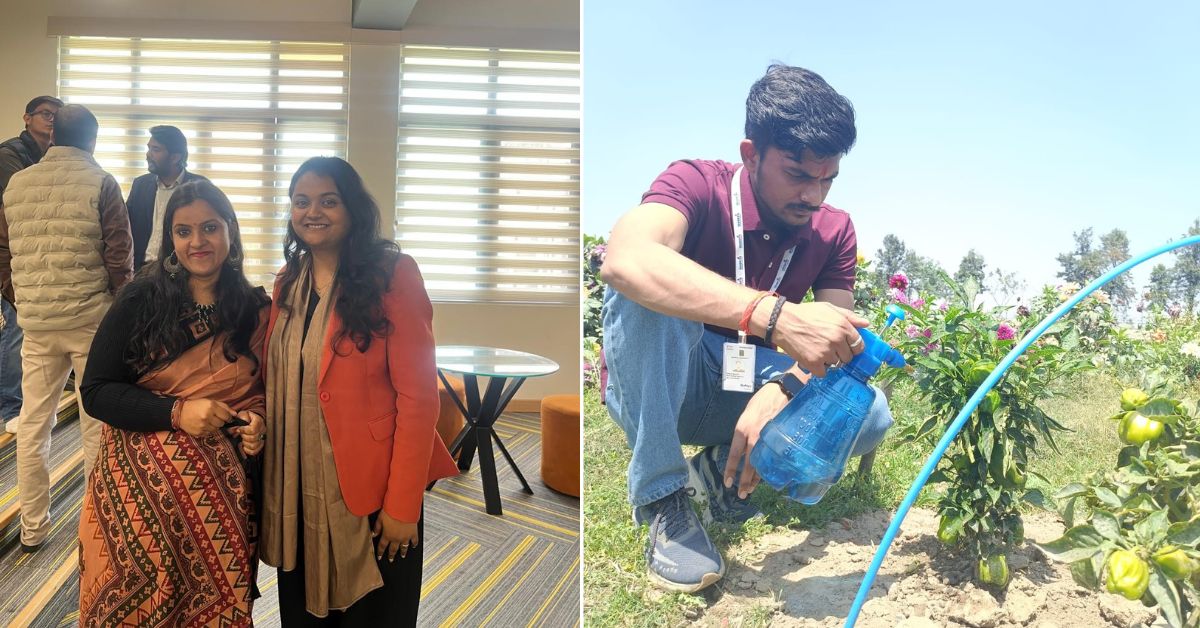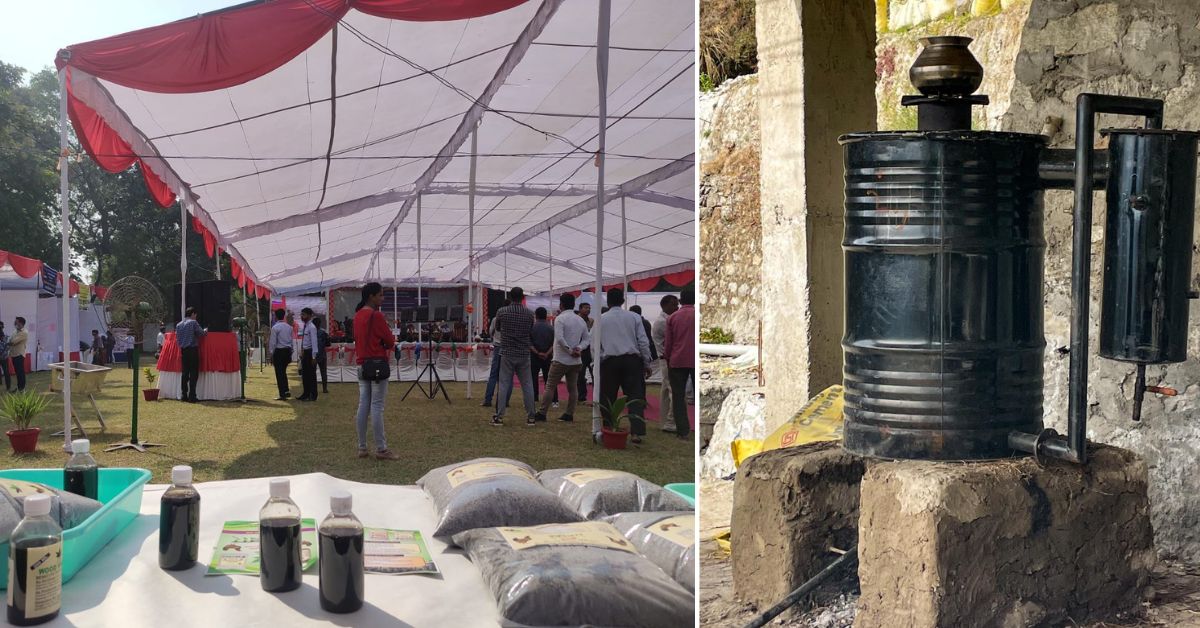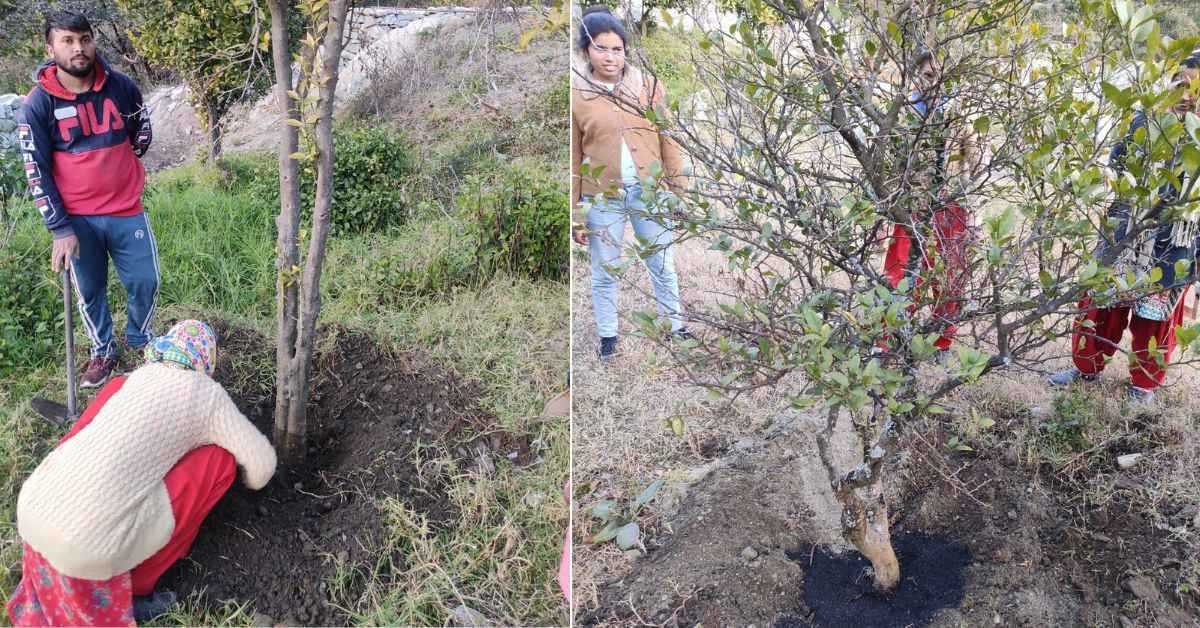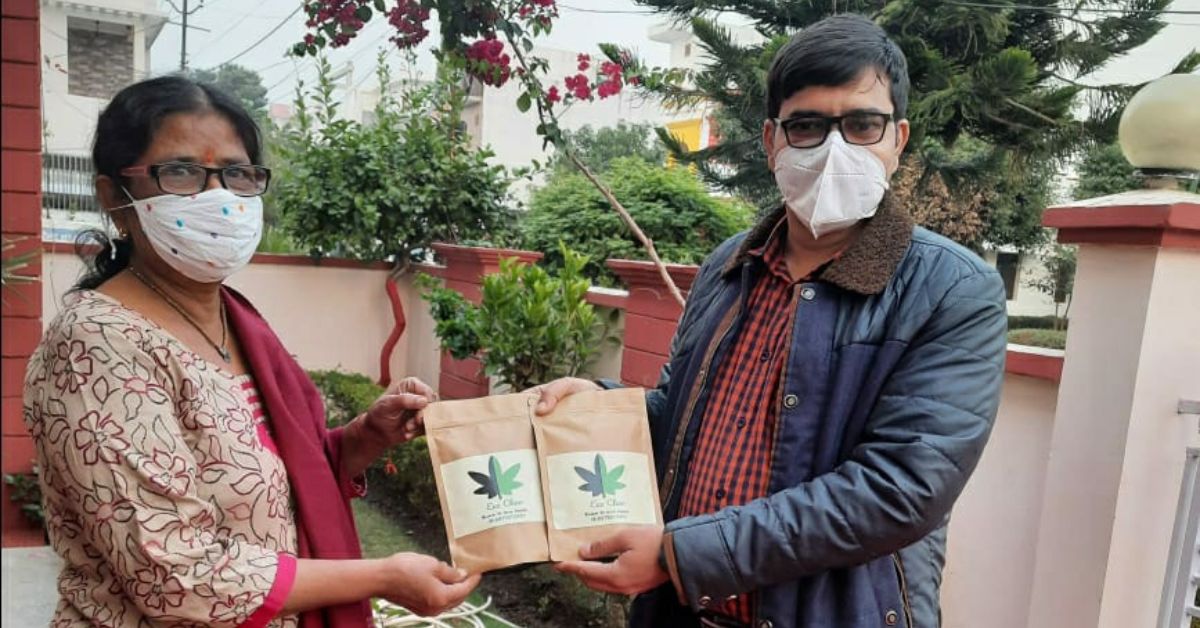This Doctor Quit Her Medical Career to Fight Forest Fires With Farming Solutions in Uttarakhand
Jignesh Patel, a mango orchard owner from Surat in Gujarat, tends to 400 mango trees. This past February, he tried using wood vinegar for the first time. He procured a litre of it and diluted it with 300 litres of water to spray on his mango trees. The results were impressive.
Previously, Jignesh had experimented with various local pesticides, but they proved ineffective for his organic farming practices. “Last year, despite getting good flowering on my trees, hardly any of them could produce any fruit. Pest damaged almost 90 percent of my crop,” he recalls.
To combat this, Jignesh found that he needed to spray wood vinegar at least six times in a season. “For Rs 150 per litre, the wood vinegar proved a worthy investment. This season, I anticipate a yield of 1,500 kilograms of Kesar mangoes, and I am hopeful for substantial profits,” he smiles.
The success he observed with wood vinegar was so encouraging that he has now ordered 50 bags of biochar fertilisers as well. “To further enhance mango production, I am also turning to biochar fertilisers,” he adds.
Jignesh was surprised and fascinated when he learnt that these products were made from pine needle waste.
 Dr Megha engineered biochar-based feed supplements and bio-fertilisers for agriculture.
Dr Megha engineered biochar-based feed supplements and bio-fertilisers for agriculture.
Data suggests that Uttarakhand’s forest fires have burned over 54,801 hectares of land since 2000. Historically, the accumulation of pine needles on the forest floor has been a major reason for spreading fires in the state. Over 71 percent of the state’s land is forested and pine trees – locally known as Chir ka ped – cover about 16 percent of the forest area in the state.
To address this problem, Dr Megha Saxena is making waves with her innovative solutions.
Quit medicine to become an entrepreneur
A former practitioner at a government medical college in Almora, Dr Megha found her calling amid the rustling pines as she turned an overlooked environmental issue into a groundbreaking venture with wide-reaching implications.
During her tenure in Almora, Dr Megha observed a critical problem that was both pervasive and largely ignored — pine needle waste.
“These dry, fallen needles, covering the forest floor, act as highly flammable material that fuels devastating forest fires, turning vast expanses of the forest into charred ruin every year. The fiery destruction not only threatens biodiversity but also contributes significantly to carbon emissions,” she shares.
Driven by a desire to mitigate these environmental hazards, Dr Megha embarked on a journey to transform this abundant waste into something of value.
 The biochar-based products optimise plant health, enrich soil quality, and improve the living conditions for poultry.
The biochar-based products optimise plant health, enrich soil quality, and improve the living conditions for poultry.
Her inspiration was twofold. While the immediate environmental concerns presented themselves to her during her stay in Almora, her background in medicine and the dire health impact of chemical pesticides on humans drove her to develop eco-friendly solutions in agriculture.
“I saw entrepreneurship as a means to apply my medical insights to environmental and agricultural challenges, such as reducing antibiotic use in agriculture due to chemical residues,” she adds.
She devised innovative methods to use pine needle waste effectively. Even after stepping back from her medical role due to family concerns during her work amid the COVID-19 pandemic, she took her maternity leave to focus on transforming a pervasive environmental issue into a business opportunity.
To this end, she founded her startup ‘EcoChar’ in 2021.
One problem, two solutions
The principal solution that Dr Megha developed was rooted in biochar, a form of charcoal that is created by pyrolysing organic material in the absence of oxygen. “Biochar has properties that make it an excellent soil enhancer, capable of improving soil fertility while simultaneously sequestering carbon,” she says.
Through innovation and collaboration with experts, Dr Megha engineered biochar-based products that serve as feed supplements for poultry and fish farms, and bio-fertilisers for agriculture.
“Not only did these products prove effective in reducing the use of chemical fertilisers and pesticides, they also minimised the ammonia odour and the necessity for antibiotics in poultry farming,” explains Dr Megha.
 Her startup, EcoChar, not only improves soil fertility but also promotes sustainable farming.
Her startup, EcoChar, not only improves soil fertility but also promotes sustainable farming.
Her methodology involved setting up demonstration farms where trials of these products could be conducted. These trials showed promising results: the biochar-based products optimised plant health, enriched soil quality, and improved the living conditions for poultry, reducing the prevalence of disease among livestock.
This testing phase laid the groundwork for broader adoption among local farmers, showing both the environmental and agricultural benefits.
Beyond enhancing agricultural productivity and ecological balance, the shift towards these pine needle-derived products reduced the carbon footprint of local farming practices. “A kg of biochar has the potential to sequester 1.6 kgs of carbon dioxide, thereby substantially negating the environmental impact of agriculture — a notoriously carbon-intensive industry,” she adds.
Yet, Dr Megha’s endeavour wasn’t just about environmental and agricultural reform. She also saw it as a vehicle for social change. Rural women, who traditionally collected pine needles to clear the forest floor, found new opportunities to produce value-added products such as soap and crafted goods from the pine needles.
 Dr Megha says biochar has properties that make it an excellent soil enhancer.
Dr Megha says biochar has properties that make it an excellent soil enhancer.
Despite the promise and potential of her ventures, the journey was not without its trials. Transitioning from a career in medicine to entrepreneurship was daunting. The volatile nature of entrepreneurship, accompanied by a lack of pre-existing plan, meant that Dr Megha was stepping into uncharted territories, tackling challenges as they came.
Establishing the business required careful financial management, initially funded through grants and later sustained by modest sales and reinvestment of profits. The estimated monthly sales revenue for her company is about Rs six lakh, indicating a successful reception and consistent application of her solutions by about 60 farmers.
Commenting on her decision to pivot from a secure medical career to this demanding and dynamic field, she says, “I embrace the unpredictability of entrepreneurship with evident enthusiasm. Every day presents itself as a new challenge, making the pursuit all the more rewarding.”
Dr Megha further aims to grow the biochar cattle feed line by incorporating local herbs and agro-waste, boosting animal health and productivity. Her future plans involve establishing decentralised production hubs near farming clusters and partnering with research institutions to patent innovative biochar formulations.
All images courtesy Dr Megha Saxena
News